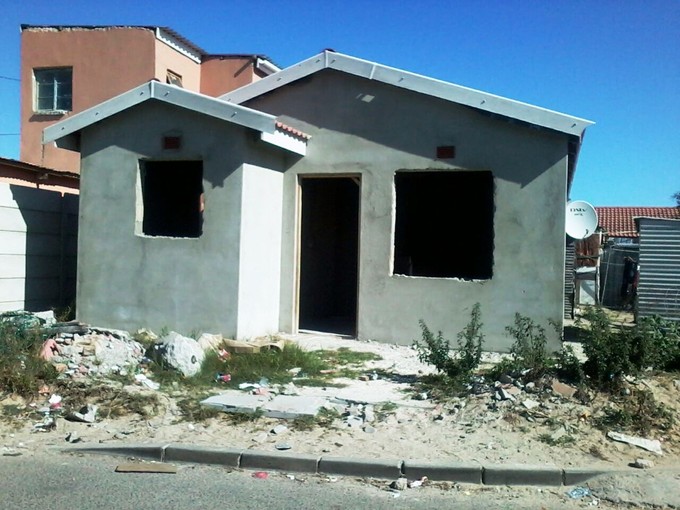Five years building an RDP house and still not finished
Construction companies leave residents in the lurch
Fish Banga, who lives in Masiphumelele, is tired of waiting for his RDP house to be completed. It has been over five years since the construction of his house started. The house still has no windows, doors or ceilings. It has not been painted nor does it have electricity and plumbing. The roof tiles are starting to fall off.
Banga has scraped together enough money of his own to fix up one room to occupy. It has a window closed up with ceiling boards. Banga says that as soon as he has the money, he will fit it with glass.
When the construction company came to build the house they also demolished his brick enclosed outside toilet, saying he need not worry as they would finish the house soon. He says he spent two years asking neighbours for permission to use their toilets.
He has now also made his own toilet.
The name of the owner of the contracting company is Stanford Dyani. He refused to tell GroundUp the name of his company. (We are trying other means to find out the name.) When asked for comment, he asked to meet GroundUp, and then failed to pitch.
“They [the construction company] started with the foundation. Then, they disappeared. I have spoken to the contractor a number of times and they keep telling me they will come, but that never happens, and if they do [arrive], they do one thing and then disappear again,” says Banga.
“Some people have finished their own houses, but some of us can’t, so we have to wait for whenever they decide to come finish these houses.”
Banga earns a living by transporting school kids from Masiphumelele to schools nearby, including Simon’s Town. He supports his daughter who lives in a shack behind the unfinished house.
Unfinished business
A few houses away from Banga is Busisiwe Mondi’s house. She too stays in a two-roomed shack with her sister and four children behind her unfinished RDP house. The shack is not big enough for her family, she says. One room has to function as a kitchen, bedroom and sitting room.
Mondi recently got a job at Checkers. “Sometimes I go to work at half-past four in the morning and it’s dark,” she says. Leaving for work, she has found blankets and traces of people squatting in her empty RDP house.
She says that before the houses were built, the community went to the Department of Human Settlements and told them that they did not want the contractor that was assigned to them.
Banga and Mondi say they were told that their subsidies would be given to a contractor of their choice, but then the contractor that they expressly said they did not want came to build their houses.
“We know he has a reputation of not finishing houses and that is why we did not want him … because we suspected that this will happen to us as well.”
“The house is starting to fall apart before it is even finished. I worry that it will fall before I even stay in it,” said Mondi.
Community leader Sebenzile Moyo says he was elected to be the middle man between the beneficiaries and the contractors. He says he has tried to get hold of the contractors and every time they tell him they are coming.
Mayoral Committee Member for Human Settlements Benedicta Van Minnen said that the Masiphumelele Phase 5 Project commenced in September 2012 and that 13 houses were left unfinished.
According to Van Minnen, People’s Housing Process projects are community-run projects where the beneficiaries appoint a contractor and manage the project themselves via an elected support organisation.
“In this particular matter … the support organisation appointed a contractor who after only completing and handing over 42 houses went into liquidation.”
“The support organisation then appointed a second contractor who struggled to complete the unfinished units and some new houses, before he too failed to complete and left the project,” said Van Minnen.
“We have requested the Western Cape Government’s Department of Human Settlements to unblock the project by completing the incomplete houses so that they can be handed over to the beneficiaries.”
Support independent journalism
Donate using Payfast

Don't miss out on the latest news
We respect your privacy, and promise we won't spam you.
© 2016 GroundUp. 
This article is licensed under a Creative Commons Attribution-NoDerivatives 4.0 International License.
You may republish this article, so long as you credit the authors and GroundUp, and do not change the text. Please include a link back to the original article.

